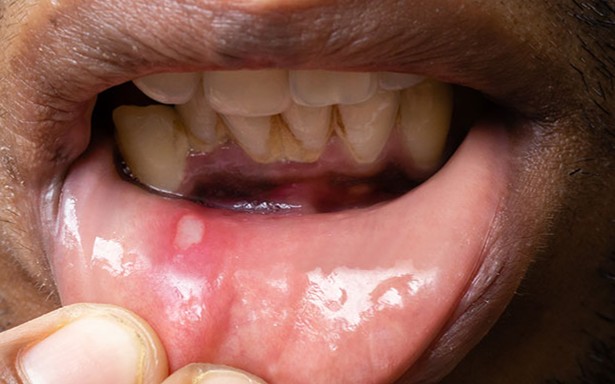WHAT ARE MOUTH ULCERS AND HOW DO THEY PRESENT?
Mouth ulcers are painful sores that occur due to a variety of causes. They are also called canker sores or aphthous ulcers, and are small, painful lesions on the inside of the mouth, on the tongue, lips, or gums. They are typically pink or red with a white or yellow center.
Symptoms include pain, burning sensations, redness and mild swelling, and difficulty while eating, drinking, and sometimes speaking comfortably. Sometimes mouth ulcers can cause bad breath (halitosis) or a bad taste in the mouth because the bacteria associated with ulcers or additional infections like gingivostomatitis. Also, the process of ulcer healing can produce foul-smelling compounds.

WHAT CAUSES MOUTH ULCERS?
Common causes include:
- Injury like accidental bites, sharp teeth, or rough brushing
- Nutritional deficiencies of vitamin B12, zinc, or folate
- Stress (mental and physical) and sleep deprivation are common triggers
- Allergies or Sensitivities to certain foods like citrus, chocolate, spicy foods, or acidic drinks.
- Medical conditions like diabetes, acid reflux disease, and conditions or medications leading to a weakened immune system.
- Autoimmune diseases like Crohn’s Disease and Celiac Disease are associated with oral lesions and ulcers. Others include Sjögren’s syndrome, Systemic Lupus Erythematosus (SLE), Behçet’s Syndrome, Pemphigus Vulgaris, and Pemphigoid.
- Hormonal changes during puberty and perimenopause
- Infections by bacteria like Helicobacter, Streptococcus, Actinomyces, and some viruses. A cold sore is a painful, fluid-filled blister that ruptures and forms an ulcer, then a crust, and is caused by the herpes simplex virus (HSV). Hand-foot-mouth disease (HFMD) ulcers are typically painful red spots that develop into painful ulcers on the tongue, gums, and inside the cheeks, appearing one to two days after the viral fever starts. Candida (yeast fungus) mouth ulcers, also known as oral thrush, present as white, creamy, or sore lesions, often on the tongue, inner cheeks, or other parts of the mouth.
WHAT ARE THE HEALTH MEASURES TO BE TAKEN AT HOME?
Basic measures include:
- Rinsing with warm salt water can provide relief.
- Maintaining oral hygiene with an antiseptic non-alcoholic mouthwash post-meal.
- Avoiding aggressive brushing, and instead using a soft toothbrush.
- Maintaining a balanced diet, with plenty of water, and avoiding spicy foods.
- Managing stress, and ensuring good sleep.
- OTC medicines like mouth anaesthetic gels, or herbal applications of aloe vera gel, honey, chamomile tea, or a turmeric paste.
WHEN SHOULD ONE SEEK MEDICAL CONSULTATION?
Most mouth ulcers heal within one to two weeks with home care, but some require medical attention as below:
- Large, extremely painful ulcer
- Lasting longer than three weeks
- Recurrent – occurs repeatedly 3-4 times a year or more
The doctor will take a thorough lifestyle and diet history, and do a clinical examination. Blood tests to check for blood counts, blood sugar, and general kidney, liver function, as well as nutritional deficiencies, especially of iron and B12, may be recommended. In some cases, specific markers for gluten sensitivity (celiac disease), inflammatory bowel disease, or other autoimmune diseases, etc. may also be checked for. If the mouth ulcer displays red flag signs as below, a biopsy may be advised.
MEDICINES FOR MOUTH ULCERS
- Anesthetics, anti-inflammatory, and soothing agents like benzocaine, lidocaine, choline salicylate or salicylic acid, tannic acid, glycerine, menthol, etc. (found in OTC products like mouth gels and ointments).
- Mucosal protectants for mouth ulcers create a protective barrier, relieve pain, and promote healing through ingredients like bismuth compounds, sucralfate, or polymers such as polyvinylpyrrolidone and hyaluronic acid.
- Non-alcoholic antiseptic mouth rinses (commonly available OTC) and prescription mouth rinses containing chlorhexidine, benzydamine, cetrimide, or dexamethasone
- Corticosteroid ointments or gels like triamcinolone, fluocinonide, beclomethasone or hydrocortisone. Sometimes prednisolone tablet may be prescribed to keep on the mouth sore.
- Vitamins -Mineral supplements including oral iron, folate, and vitamin B12 with zinc, often along with other B complex vitamins.
- Antibiotic or Antifungal course may be given in some cases
- Probiotics are also prescribed in recurrent cases
- Antacid medicines may be given if acid reflux is suspected.
WHAT ARE THE RED FLAG SIGNS?
Some signs below can suggest more serious disease including the possibility of the ulcer being cancerous, so should be examined thoroughly by a doctor.
- An ulcer with irregular, raised, or hard edges, or a lump underneath it, or a persistent lump on the tongue, in the neck, or elsewhere in the mouth.
- A sore that bleeds easily
- A red or white patch on the tongue, gums, or inside of the mouth
- Impaired movements of the tongue or jaw, or pain when chewing or opening the mouth.
- A hoarse or croaky voice or other changes in speech.
- Unexplained and persistent numbness in the lip or tongue.
- Loose teeth or sockets that don’t heal after extraction.
- General signs like associated fever or weight loss.
Also read:
Bad or unpleasant taste in the mouth – Why it occurs and What to do
Acidity, Gastro-Esophageal Reflux Disease (GERD), Dyspepsia (Indigestion) and Ulcers
Skin Infections – Types, Predisposing Factors and Health Measures

